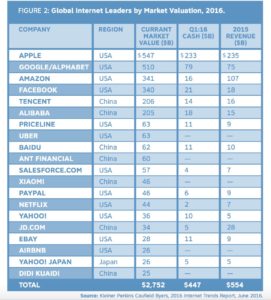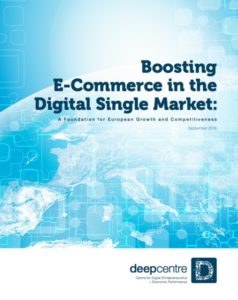European business leaders and policymakers have long lamented Europe’s apparent inability to foster the creation of preeminent global technology champions like Apple, Amazon, Facebook and Google. In fact, in a ranking of the top global Internet leaders by market valuation, there is not a single European firm in the top 20, a list which is dominated almost exclusively by Chinese and American Internet companies.
 Europe’s failure to make a dent in the top 20, despite many innovation assets, has led to numerous efforts to understand its relative underperformance. After all, the continent is not short of homegrown engineering talent and digital thought leadership (although it’s true that much of its top talent is scooped up by American tech firms). Leading EU countries also have startup creation rates that compare favourably with the United States. Moreover, Europe boasts an integrated internal market of over 500 million affluent consumers, which should, in theory, provide a powerful launching pad for world-changing technologies and companies. And yet, promising European tech startups like Skype and Spotify found large-scale commercial success in the United States long before they had tapped the full potential of their native continent.
Europe’s failure to make a dent in the top 20, despite many innovation assets, has led to numerous efforts to understand its relative underperformance. After all, the continent is not short of homegrown engineering talent and digital thought leadership (although it’s true that much of its top talent is scooped up by American tech firms). Leading EU countries also have startup creation rates that compare favourably with the United States. Moreover, Europe boasts an integrated internal market of over 500 million affluent consumers, which should, in theory, provide a powerful launching pad for world-changing technologies and companies. And yet, promising European tech startups like Skype and Spotify found large-scale commercial success in the United States long before they had tapped the full potential of their native continent.
To shed light on this dilemma, I was invited to Brussels to brief the European Parliament’s Committee on Internal Market and Consumer Protection and present a report on “Boosting E-Commerce in the Digital Single Market” (an annotated transcript of the session is available here). Today, I’m pleased to publish a new piece of work that summarizes the DEEP Centre’s recommendations for how to strengthen the enabling conditions for entrepreneurial success in Europe, particularly in the domain of digital services and e-commerce.
There are various theories on Europe’s underperformance, but one underlying truth highlighted by the research is that European entrepreneurs face far too many stumbling blocks to growing their businesses. While Europe’s market of 500 million consumers sounds alluring, the practical reality is much less inspiring. For example, digital startups seeking to do business across Europe must contend with a patchwork of 28 different legal regimes and varying VAT obligations, expensive and unreliable cross-border shipping, inconsistent copyright laws and burdensome country-by-country restrictions on digital content like streaming movies and TV shows.
The presence of significant national fragmentation in Europe’s market for e-commerce and digital services is among the key reasons why European startups struggle to realize the true potential of the continent’s market of 500 million consumers. In fact, although half of European retailers are online, only 21% sell in other EU member states and those who do limit their exports to a few countries, with the European average being 1.8 territories per company.
In an effort to make Europe fit for the digital age, European public policymakers have prioritized the creation of a Digital Single Market (DSM) in which digital goods and services can move seamlessly across the 28 member nations under the same set of rules. The proposed single market for digital services would create uniform rules that protect intellectual property, safeguard consumer data, eliminate mobile-phone roaming charges and end discriminatory practices such as geo-blocking digital content. The European Commission estimates the DSM would contribute €415 billion to the European economy, boosting jobs, growth, competition, investment and innovation. Indeed, as Google chairman Eric Schmidt rightly observes: “A digital single market will give European entrepreneurs, who have all the right building blocks, the incentive to invest and the ability to achieve global scale at greater speed.”
While the benefits of a seamless and fully-functioning digital market are not in dispute, our research suggests market fragmentation and regulatory barriers in Europe are not the only — or even the most significant — hurdles that entrepreneurs face in building viable growth companies. A growing body of research suggests the more intractable inhibitors to growth are related to the ability of firms to access a full spectrum of risk capital, acquire anchor customers and attract the sophisticated management talent to lead key corporate functions such as international sales, marketing and business development. Most of these issues have been entirely overlooked in the European Commission’s strategy for the Digital Single Market.
For Europe to become a creator of global technology champions, European policymakers must not only prioritize much needed regulatory reforms; they must also establish a series of entrepreneurial building blocks required to enable its highest-potential companies to grow beyond Europe’s borders and become the significant global employers of tomorrow. Among other things, these building blocks include an ample supply of capital; access to anchor customers and sophisticated management talent; and well-coordinated supports for scale-ups and internationalization. After all, Europe will not realize the full benefits of eliminating barriers to cross-border commerce if, in reality, few of its firms can acquire the capital, management talent and market sophistication required to reach scale without relocating their operations to leading tech-hubs such as Boston, New York or Silicon Valley.
To learn more about our analysis and recommendations, be sure to read the report and let us know what you think.
